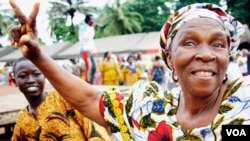The chairman of Guinea’s Independent National Electoral Commission, Bakary Fofana, said Wednesday the country’s long-delayed parliamentary election will take place May 12 of next year.
Guinea has not had parliamentary elections since June 2002, during the late President Lansana Conte’s administration.
The opposition has accused President Alpha Conde’s government of preparing a fraudulent election.
Mamadou Dian Balde, editor-in-chief of the Independent and Democrat newspapers, said there has been no immediate reaction from the opposition about the new date.
But, Balde said one opposition leader has said that he wants to know if the new date was decided by all electoral commission members or unilaterally by Fofana.
“The opposition has not made an official comment of the election, but opposition leader Cellou Dalein Diallo [who came second during the 2010 election] said today that they are trying to know if the date has been decided by all the commission members or if the decision has been taken unilaterally by Bakary Fofana,” he said.
The opposition has accused Conde’s government of preparing for a fraudulent election.
Balde said he is not sure if the opposition would accept the May 12 date. But, he said one criticism the opposition has made recently about the preparation for the parliamentary elections is the government’s use of Waymark, the South Africa-based information consulting firm.
“There are problems with the preparation of the election about Waymark from South Africa, which has been chosen by the government only to help in the Independent National Electoral Commission in managing this election. But, the opposition said it does not agree with the way that Waymark has been chosen. They think that Waymark will help President Conde to steal the election,” Balde said.
He said some in the opposition have threatened to boycott the legislative election if the issue of Waymark is not resolved quickly.
Balde said a National Transition Council set up in 2010 has been fulfilling the legislative role in the absence of an elected parliament.
“When the junta took place after the death of President Lansana Conte, the parliament had been dissolved and the National Commission took over and it’s making laws before the parliamentary election,” Balde said.
Guinea has not had parliamentary elections since June 2002, during the late President Lansana Conte’s administration.
The opposition has accused President Alpha Conde’s government of preparing a fraudulent election.
Mamadou Dian Balde, editor-in-chief of the Independent and Democrat newspapers, said there has been no immediate reaction from the opposition about the new date.
But, Balde said one opposition leader has said that he wants to know if the new date was decided by all electoral commission members or unilaterally by Fofana.
“The opposition has not made an official comment of the election, but opposition leader Cellou Dalein Diallo [who came second during the 2010 election] said today that they are trying to know if the date has been decided by all the commission members or if the decision has been taken unilaterally by Bakary Fofana,” he said.
The opposition has accused Conde’s government of preparing for a fraudulent election.
Balde said he is not sure if the opposition would accept the May 12 date. But, he said one criticism the opposition has made recently about the preparation for the parliamentary elections is the government’s use of Waymark, the South Africa-based information consulting firm.
“There are problems with the preparation of the election about Waymark from South Africa, which has been chosen by the government only to help in the Independent National Electoral Commission in managing this election. But, the opposition said it does not agree with the way that Waymark has been chosen. They think that Waymark will help President Conde to steal the election,” Balde said.
He said some in the opposition have threatened to boycott the legislative election if the issue of Waymark is not resolved quickly.
Balde said a National Transition Council set up in 2010 has been fulfilling the legislative role in the absence of an elected parliament.
“When the junta took place after the death of President Lansana Conte, the parliament had been dissolved and the National Commission took over and it’s making laws before the parliamentary election,” Balde said.






